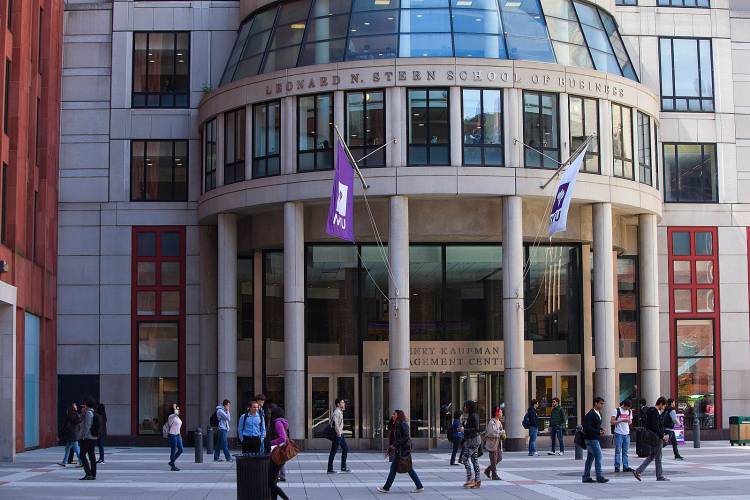New York City is a commercial dynamo, one of the major centers of the global economy and historically a leader in media, finance and fashion. Such advantages are not lost on NYU Stern and Columbia Business School, the two top MBA providers in the Big Apple.
“NYC’s urban business setting is definitely an advantage for many career paths, including finance,” says Stacy Blackman, an admissions consultant in Los Angeles. “At Columbia and NYU, accessibility to recruiters and world-class industry experts and professors is unparalleled.”
The Financial Times Global MBA ranking 2018 put Columbia at number seven in the world, with NYU in 23rd place. Bloomberg’s Businessweek list placed Columbia in ninth place in the US, and NYU at number 18. Applicants almost always prioritize reputation in selecting between Columbia and NYU, according to admissions consultants, and brand is often signalled by relative ranking across the major media publications.
Aside from rankings, MBA applicants should turn to other criteria to make their choice, such as: student culture, admissions processes offers and career outcomes.
NYU vs. Columbia: MBA program comparison
Both NYU and Columbia run high-quality MBA courses.
Columbia offers greater flexibility of study, with full-time students joining in either August (a 20-month program) or January (a breezier 16 month curriculum). NYU Stern students start in the fall and study for two years. “The option to start in January instead of August can be a major attraction to students who are coming from family businesses or are sponsored by their firms and don’t have a need to complete a summer internship,” says Chioma Isiadinso, an admissions consultant in New York City.
Top 10 MBA Programs in New York
Another differentiating factor is class size. Columbia’s MBA is considerably larger at 753 total students, compared with NYU’s 399-strong cohort. Both schools divide students up into clusters. “Given Columbia’s large entering class size, it offers a broader network compared to smaller programs like NYU,” says Isiadinso. Columbia boasts a global network of 39,000 full-time MBA alumni alone.
 Both schools rely on case studies to teach their MBA courses, along with guest speakers — a benefit of their New York City base. Columbia commonly hosts C-Suite speakers comparable to Harvard Business School, admissions consultants say, including the CEO of Anheuser Busch International and representatives from McKinsey & Company.
Both schools rely on case studies to teach their MBA courses, along with guest speakers — a benefit of their New York City base. Columbia commonly hosts C-Suite speakers comparable to Harvard Business School, admissions consultants say, including the CEO of Anheuser Busch International and representatives from McKinsey & Company.
A student’s choice between NYU and Columbia also can be driven by their fit with particular programs. NYU’s new one-year Tech MBA and Fashion & Luxury MBA programs are drawing interest from specialized candidates. Media, tech and retail are seen to be stronger at NYU than Columbia, say admissions consultants.
[Related Article: An MBA in New York City: If You Can Make It There, You Can Make it Anywhere]
NYU’s full-time MBA offers a whopping 20 specializations—such as Banking, FinTech, and Product Management—from which students can select up to three. On the other hand, while Columbia’s MBA doesn’t have any official specializations, it does offer a range of electives.
NYU vs. Columbia: admissions process comparison
For the schools’ full-time MBA programs, the 2018 admission rate to NYU is 21 percent, while Columbia’s is 16 percent, so getting into either of these two schools is very competitive.
Columbia is on a rolling admissions basis, except for its Early Decision option where applicants have to apply by a certain date to be considered for admission to the MBA. NYU has four deadlines (on the 15th of October, November, January and March).
Both schools rely on essays, resumes and reference letters in evaluating prospective students. In addition to the essay requirement at NYU, the school asks applicants to pick six images that best describe who they are. Applicants at NYU also have the option to choose a personal reference in addition to a professional reference and the school describes this as “EQ recommendations”.
Interviews at both schools are on an invitation-only basis. The interviews are held both on campus or in the country where the applicant resides. The main difference is that Columbia relies on alumni to interview their applicants and the interviews are blind — the interviewer only has the applicant’s resume and not the application. NYU is different in that interviewers are admissions staff and they have read the entire application.
According to Blackman, NYU typically shows more flexibility in admitting candidates. The school is more willing than Columbia to accept a candidate whose employer is not well-known or whose GMAT score is not high, the consultant says. One potential upside of this relative flexibility by NYU is that the program tends to “attract a down-to-earth, humble student class”.
“Any sign of competitiveness or arrogance was a turn off,” says a former NYU admissions officer who works at Stacy Blackman Consulting. “We also were sensitive to those ‘leaders’ that were pushy or always needing to lead.”
NYU Stern MBA student Vikram Gulati says: “I really identify with the student population, and I am proud to say that we are probably the most collaborative among the top MBA programs”
Gulati adds that, “from what I hear from my friends in other schools, Stern is way above and beyond everyone else in terms of sheer niceness of students — everyone is super helpful and willing to put in tons of time, often with absolutely no reciprocity or even the expectation of anything”.
Columbia did not put forward a spokesperson for this article.
NYU vs. Columbia: MBA career outcomes comparison
Both NYU and Columbia have been trying to move away from being perceived as “finance schools”, consultants claim.
NYU can be an attractive choice for students with varied interests that go beyond finance. According to NYU’s 2016 employment report, the school’s top three recruiters were Deloitte Consulting (22), Citi (14) and Amazon (13). The school also had plenty of opportunities in luxury and consumer goods, “so students with a broader career interest base would find a great home at Stern”, says Isiadinso.
 Columbia has slightly higher placement into consulting and finance than NYU, but candidates also enter the media and technology industries in large numbers, and manufacturing, to a lesser extent. In fact, according to the school’s Employment Report, the three top employers of 2017 graduates were consulting firms (McKinsey — 55, the Boston Consulting Group — 36, and Bain & Company — 27).
Columbia has slightly higher placement into consulting and finance than NYU, but candidates also enter the media and technology industries in large numbers, and manufacturing, to a lesser extent. In fact, according to the school’s Employment Report, the three top employers of 2017 graduates were consulting firms (McKinsey — 55, the Boston Consulting Group — 36, and Bain & Company — 27).
The bottom line: both NYU and Columbia are top schools whose students enjoy unparalleled advantage, being based in the Big Apple.
Images:
- Columbia Business School by Michael Filtz
- NYU-Stern by Memorial Student Center Texas A&M University / CC BY 2.0










